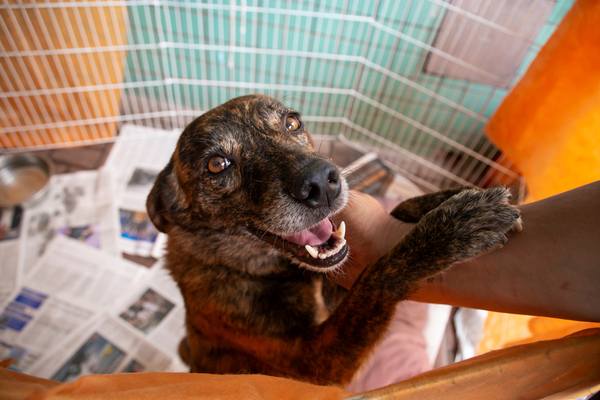In addition to the burgeoning of spring and new life, April honors our animal friends with Prevention of Cruelty to Animals Month. The annual 30-day campaign is hosted by the American Society of the Prevention of Animal Cruelty (ASPCA) and offers opportunities for the public to become involved in safeguarding the wellbeing of animals.
The ASPCA combats animal cruelty with advocacy efforts focused on dogfighting, the commercial puppy industry, animal hoarding, farm animal welfare, horse slaughter, cockfighting, and greyhound racing. Actions to address the effects of these practices include animal rescue, placement, and protection. The ASPCA and other animal welfare nonprofits like the Humane Society of the United States (HSUS) lead animal protection policy-making efforts as well as the prevention of animal harm inflicted by industries like agriculture, entertainment, fashion, and cosmetics. But their efforts depend on the support of concerned individuals and volunteers willing to lend their time (and/or money) to the cause.
According to the ASPCA, animal cruelty can take on many different forms and ranges from unintentional neglect to acts of intentional harm or killing. The majority of investigated neglect cases are unintentional and resolved through education. Cases of intentional cruelty towards animals, on the other hand, are indicative of psychological distress. Such individuals have often been victims of violence themselves and may be prone to perpetrating further acts of violence towards animals or people.
In fact, research compiled by HSUS has shown evidence for a strong correlation between cruelty towards animals and other forms of abuse such as child, spousal, and elder abuse. In one survey, 71 percent of domestic violence victims reported that their abuser also targeted pets. Another study found that pet abuse had occurred in 88 percent of families under supervision for physical abuse of children. Animal cruelty is also one of the criteria used by the American Psychological Association to diagnose conduct disorder.
Causes of Animal Abuse and Neglect:
- Hoarding
- Lack of veterinary care
- Inadequate shelter
- Chaining (of dogs)
- Abandonment
- Pets left in cars
- Beating and physical abuse
- Animal fighting and other forms of organized cruelty
The organization also provides training to animal welfare agencies, law enforcement, and prosecutors in addition to:
- Promoting public education
- Advising local agencies and providing grants to support local cases
- Direct intervention and rescue in large-scale cruelty cases
- Conducting investigations for institutionalized agribusiness cruelty
- Lobbying for stronger animal protection laws
- Offering rewards for information leading to animal fighting or cruelty convictions
Here’s how you can Become an Animal Advocate:
Raise Awareness and Educate. You might consider educating friends, neighbors or other people you know about proper pet care, such as discouraging the use of prong or choke collars to train dogs. Bringing more awareness to animal cruelty is an important part of helping people understand how widespread this problem is and what they can do about it. While not all cases of animal cruelty are reported, statistics show that the majority of reported cases involve dogs. Cats, horses and livestock are also victims of abuse and neglect. Animal cruelty doesn’t just involve individual pets. Organized incidents, such as dog fighting, also put animals at risk of cruelty.
Report Cruelty or Neglect. If you see any cases of animal abuse or neglect in your area, make sure that you report it to the proper authorities. This might be local law enforcement, your local animal control agency, a humane organization or an animal shelter that is funded by local taxpayers. Find out which of these organizations looks into cases of animal cruelty and enforces laws and regulations against it. You can do this by contacting your local animal control agency or a local shelter for more information. Reporting cases of animal cruelty and encouraging others to do so can also go a long way toward preventing further abuse or neglect.
Get Involved with Anti Cruelty Legislation in your area. Concerned individuals should become familiar with the protections that currently exist in their communities and states and to speak up to their appropriate local agencies when they suspect cruelty in their community. You can also engage at state and local levels to advocate for legislation or ordinances to better protect animals when existing protections fall short.
Help Local Rescue Organizations. Local rescue organizations often need help from volunteers or donors. You can help out by fostering a pet if possible, or you can help by donating your time or money to support these organizations. Keep in mind that some rescue groups also need help in the form of donations of pet supplies, such as blankets or toys.
Spread the word through Social Media. Social media offers a great way to raise awareness about animals in need. Use your social media accounts to post about efforts that are being made to assist animals who are at risk of cruelty or to help those that are in need.
Adopt, Don’t Shop. If you know someone who is looking for a new pet, encourage them to consider adoption rather than purchasing a dog, cat or other animal. There are many pets in animal shelters and foster homes who need a good home.
—
Photo Credit: Jucadima / Shutterstock.com
